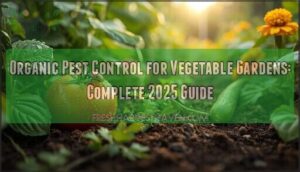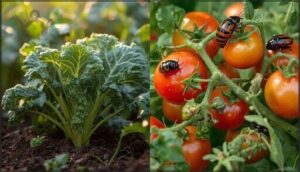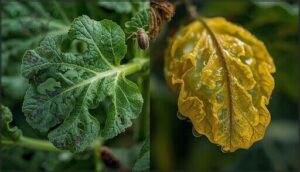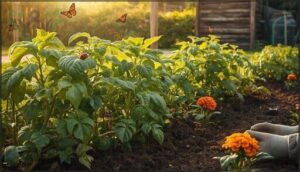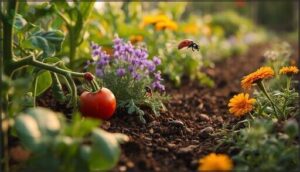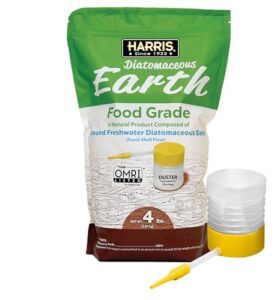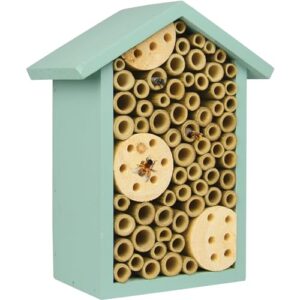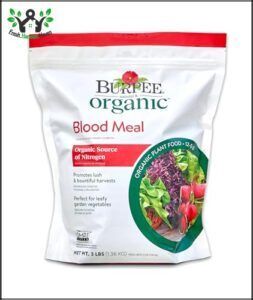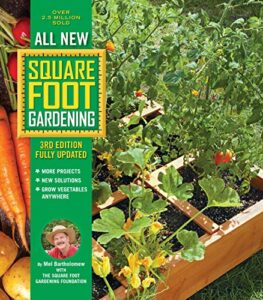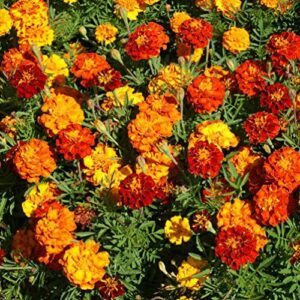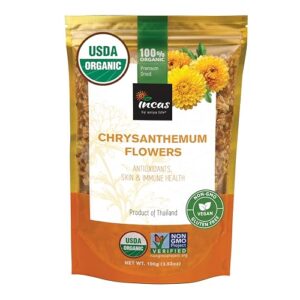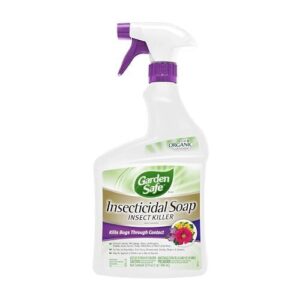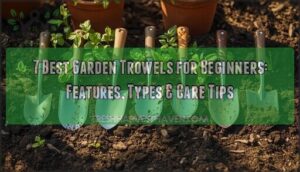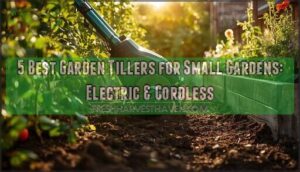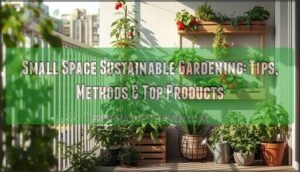This site is supported by our readers. We may earn a commission, at no cost to you, if you purchase through links.
You plant your tomatoes with care, nurture them through spring, and watch them flourish—until one morning you discover leaves riddled with holes, stems severed at the base, or fruit marred by mysterious blemishes. These aren’t random acts of nature; they’re the work of garden pests that can decimate months of effort in days.
The challenge isn’t just stopping them—it’s doing so without synthetic chemicals that linger in your soil and on your dinner plate. Organic pest control for vegetable gardens offers a science-backed approach that protects your harvest while maintaining the delicate ecosystem your plants depend on.
From understanding pest life cycles to deploying beneficial insects as natural predators, you’ll discover methods that address infestations at their source rather than merely treating symptoms after damage appears.
Table Of Contents
- Key Takeaways
- Common Vegetable Garden Pests and Identification
- Preventing Pests With Organic Gardening Practices
- Effective Organic Pest Control Methods
- Supporting Beneficial Insects and Biodiversity
- Top 10 Organic Pest Control Products for Gardens
- 1. Gardening Log Book Planner
- 2. Kirecoo Copper Foil Shielding Tape
- 3. Harris Diatomaceous Earth Food Grade Duster
- 4. Nature’s Way Teal Bee House
- 5. Burpee Organic Blood Meal Fertilizer Nitrogen
- 6. Seven Springs Farm Wood Ash Sifted
- 7. All New Square Foot Gardening Guide
- 8. French Marigold Seeds Vibrant Garden Mix
- 9. Incas Organic Chrysanthemum Flower Tea
- 10. Garden Safe Insecticidal Soap Spray
- Frequently Asked Questions (FAQs)
- What organic pesticides work best for aphids?
- How often should I apply neem oil?
- Can I use organic methods in containers?
- When is the best time to spray?
- Which organic products are safe for pets?
- What organic methods work best against aphids?
- How often should I apply neem oil spray?
- Can I make organic pesticides at home safely?
- Which beneficial insects control the most garden pests?
- Are organic pest controls safe for edible herbs?
- Conclusion
Key Takeaways
- Rotating vegetable crop families every three to four years cuts soil-borne pathogens by 40–60% without chemicals, disrupting pest life cycles by removing host plants they need to complete reproduction.
- Organic pest control works best when you combine prevention strategies like companion planting and row covers with targeted biological methods such as neem oil, beneficial insects, and physical barriers that protect crops without harming soil ecosystems.
- Gardens using diverse flowering plants and organic management see beneficial insect populations increase by nearly 50%, creating natural predation that suppresses aphids, beetles, and other pests more effectively than treating symptoms after damage appears.
- Organic methods like insecticidal soap, diatomaceous earth, and handpicking deliver 70–90% pest control effectiveness when applied correctly, with the added benefit of breaking down rapidly to leave minimal residue on edible crops.
Common Vegetable Garden Pests and Identification
Before you can protect your vegetable garden, you need to know what you’re up against. Each pest leaves behind specific clues, from the type of damage on leaves to the time of day they’re most active.
Let’s look at the most common culprits you’ll encounter, how to spot the damage they cause, and when they’re likely to strike.
Most Frequent Pests in Vegetable Gardens
You’ll face a handful of persistent troublemakers across vegetable gardens: aphids reproduce explosively (populations doubling in two to three days), caterpillar life cycles produce multiple overlapping generations that devour foliage, and beetles create distinctive shot-hole damage on seedlings.
Stink bug impact now includes fruit deformities on tomatoes, while soil pest control targets cutworms that sever plants overnight.
Organic pest control begins with accurate pest identification of these common garden pests, which may include implementing integrated pest management.
Signs and Symptoms of Pest Damage
Once you’ve spotted the common garden pests, you’ll recognize their signatures through distinct pest damage patterns. Chewing damage appears as ragged holes and skeletonized leaves—beetles and caterpillars at work. Sucking symptoms include yellowing, curling foliage, and sticky honeydew from aphids. Mite signs show as fine stippling and bronzing, while root issues cause unexpected wilting despite moist soil.
Threshold levels help you decide when identifying garden pests warrants action versus tolerance. Understanding the differences between insect feeding types is essential for effective garden management.
How to Identify Pest Life Cycles and Habits
Understanding pest impact means tracking how pests move through life cycle stages—from egg to larva to adult. Seasonal timing and overwintering habits reveal when threats appear, while diel activity patterns show whether pests feed at dawn, dusk, or overnight. Your scouting frequency should increase during warm weather when insect infestation accelerates.
Identifying common garden pests requires observing:
- Egg clusters on leaf undersides or stems
- Larval feeding damage at peak growth stages
- Adult emergence timing linked to temperature
- Nocturnal activity missed during daytime checks
Preventing Pests With Organic Gardening Practices
Prevention is your strongest ally in managing garden pests without synthetic chemicals. By focusing on building resilient growing conditions from the ground up, you’ll create an environment where pests struggle to gain a foothold while your vegetables thrive.
The following practices form the foundation of an integrated approach that keeps pest populations naturally in check.
Crop Rotation for Pest Reduction
Rotating your crops every three to four years is one of the most powerful pest prevention strategies you can use in your vegetable garden. When you plant the same family—like tomatoes, peppers, and eggplants—in one spot year after year, you’re practically setting a feast for specialized pests and soil-borne diseases. Monoculture impact is real: research shows that repeated planting of the same crop family leads to a buildup of pathogens that can persist for years, increasing damage over time.
Here’s how rotation design works: group your vegetables by botanical family, then move each family to a different bed each season. A Texas study on nightshade vegetables found that rotating with unrelated crops for at least three years reduced soil-borne pathogen levels by 40–60% compared with continuous planting. That’s a significant drop in pest pressure without spraying a thing.
Rotating vegetable families every three years cuts soil-borne pathogens by 40–60%, dropping pest pressure without a single spray
Why Crop Rotation Works for Pest Control
| Rotation Length | Pest Reduction Benefit |
|---|---|
| 1 year | Minimal interruption of pest life cycles |
| 2 years | Moderate reduction in specialized pests |
| 3–4 years | 40–60% decrease in soil-borne pathogens |
| 4+ years | Maximum suppression of persistent diseases |
The mechanism is simple: most vegetable pests and diseases need a host plant to complete their life cycle. When you remove that host for a season or two, pest populations decline naturally. A University of Minnesota analysis reported that home gardens using well-planned multiyear crop rotations experienced approximately 40% lower soil-borne disease incidence than gardens with poor or no rotation planning.
Economic outcomes matter, too. Corn-soybean rotations that include diversity instead of monoculture see yield increases of 5–20%, partly because of lower pest and disease pressure. For your vegetable garden, that translates to healthier plants, fewer losses, and less money spent on organic pest control products.
To get started, map out your garden beds and assign each one to a crop family: Solanaceae (tomatoes, peppers, eggplants), Brassicaceae (cabbage, broccoli, kale), Cucurbitaceae (cucumbers, squash), and Fabaceae (beans, peas). Rotate clockwise each year, and consider adding a cover crop phase to further disrupt pest cycles and build soil health.
Companion Planting and Natural Repellents
Pair vegetables with the right plant-based deterrents, and you’ll watch pest pressure drop naturally. French marigolds intercropped with tomatoes reduced whitefly settlement by nearly 40% in controlled trials, while nasturtiums work as a trap crop diversion, luring aphids and squash bugs away from your main harvest.
Aromatic herb repellents like basil and thyme emit compounds that interfere with pest host-finding, while flowering companions attract natural enemies—hoverflies and parasitoid wasps—that feast on soft-bodied invaders, creating system-level impacts that lower damage across your entire vegetable garden.
Building Healthy Soil for Plant Immunity
Enriching your soil with compost and green manures boosts organic matter to 3.5–4.0%, fueling microbial communities that activate plant defense pathways against pests. Each 1% rise in organic matter can lift yields by 12%, signaling stronger immunity.
Balanced fertility—moderate nitrogen, phosphorus, and potassium—along with stable soil moisture reduces stress that invites aphids and mites, creating a soil ecosystem where your vegetables naturally resist attack.
Physical Barriers: Row Covers and Mesh
Lightweight floating row covers transmit 90–95% of light while blocking cucumber beetles and flea beetles before they reach your vegetable garden. Keep them on until flowering to protect cucurbits, then remove them for pollination—trials cut beetle pressure by 40% this way.
At roughly $0.03–$0.05 per square foot, these garden mesh barriers deliver strong organic pest control without the microclimate stress heavier fabrics can cause.
Effective Organic Pest Control Methods
Once you’ve built a strong foundation through prevention, you’ll still need targeted tools to address pest problems when they arise. The good news is that organic pest control methods can be just as effective as synthetic options, often with fewer risks to your soil, plants, and beneficial insects.
Let’s explore the most reliable organic approaches you can use to protect your vegetable garden without compromising your commitment to natural growing practices.
Homemade Sprays (Garlic, Hot Pepper, Soap)
When making your own garlic or hot pepper spray, freshness determines effectiveness—most homemade organic sprays lose potency after about seven days in the fridge. Proper spray preparation matters:
- Combine roughly four garlic cloves and two hot peppers per quart of water
- Add one teaspoon of insecticidal soap as a surfactant for better coverage
- Test on a few leaves first to assess phytotoxicity risks before full application
- Apply in early morning or late afternoon to minimize leaf burn and improve spray effectiveness
Organic Oils (Neem, Spinosad)
Neem oil spray disrupts feeding and reproduction in over 200 pest species when applied at a 2–5% concentration weekly, targeting aphids, whiteflies, and caterpillars with minimal harm to beneficial insects.
Spinosad, a fermentation-derived option, delivers 70–80% control of thrips and leafminers at low application rates.
Both degrade rapidly in sunlight, though avoid spraying during active pollinator hours to protect bees.
Diatomaceous Earth and Mineral-Based Solutions
Diatomaceous Earth works like tiny shards of glass on a microscopic scale, abrading insect cuticles and causing lethal water loss within days. When you dust your vegetable beds, you’re creating a natural barrier that doesn’t poison plants or soil.
Here are key mineral-based solutions for your IPM integration:
- Food-grade DE: Apply thin, even layers on dry foliage targeting soft-bodied pests
- Kaolin clay films: Spray 3–5% solution to reduce pest pressure fourfold
- Rock dusts: Use silicon-rich granite as both soil amendment and foliar treatment
- Wood ash mixtures: Combine with DE for enhanced beetle and bug deterrence
- Safety gear: Always wear respirator and goggles when applying mineral dusts
Field trials show DE application methods achieve 84% success against garden pests, while kaolin clay efficacy reaches competitive levels with synthetic options. These natural pest control tools provide long residual activity in dry conditions, making them practical organic pest control choices. Mineral dust safety remains high for vertebrates, though reapply after rain to maintain protection.
Biological Insecticides and Beneficial Insects
While mineral dusts target pests mechanically, biological pesticides like BT (Bacillus thuringiensis) achieve approximately 90% efficacy against caterpillars within five days, reducing plant damage from 80% to under 14%. Spinosad persistence lasts just days on foliage, making it safe for beneficial insects like predatory beetles and parasitic wasps.
Your IPM integration should combine these organic pest control tools with natural predators—ladybugs consume dozens of aphids daily, while lacewings and parasitoid wasps suppress pest populations season-long without harming your harvest.
Handpicking and Manual Control Techniques
Beyond sprays and dusts, handpicking provides up to 87% effectiveness against slugs and tomato hornworms—you can physically remove pests during daily scouting without harming beneficials. Target pest removal works best when you:
- Scout morning and evening for egg clusters and larvae
- Use manual removal tools like hand vacuums for beetles
- Prune away visible damage alongside organic system integration
Regular inspection makes physical removal your most reliable first line of defense.
Supporting Beneficial Insects and Biodiversity
Your garden doesn’t have to fight pests alone. By creating the right conditions, you can recruit an army of beneficial insects that naturally keep harmful pests in check while supporting pollination and overall garden health.
Here’s how to turn your vegetable garden into a haven for these helpful allies.
Attracting Ladybugs, Parasitic Wasps, and Predators
Because beneficial insects thrive where food and shelter are plentiful, you’ll want to plant insectary flowers that draw ladybugs and parasitic wasps into your vegetable beds. Research shows flower strips can increase lady beetle abundance by 70% and reduce pest damage by more than 60%. Choose these strategic plantings to multiply predator diversity:
| Floral Resource | Beneficial Insects Attracted | Primary Garden Function |
|---|---|---|
| Dill & Fennel | Ladybugs, parasitic wasps | Aphid control, egg parasitism |
| Buckwheat & Marigold | Parasitoid wasps, lacewings | Stink bug suppression, general predation |
| Yarrow & Sweet Alyssum | Lady beetles, predatory bugs | Habitat structure, overwintering sites |
| Sunflower & Cosmos | Garden spiders, ground beetles | Predator diversity, pollinator safety |
Leave wildflower zones and hollow stems to support overwintering populations. Organic management that avoids broad-spectrum insecticides preserves these natural allies, letting them patrol your crops season after season.
Studies confirm organic gardens with eight or more flowering species see beneficial insect abundance increase by nearly 50%, weaving a living defense against cucumber beetles, aphids, and soft-bodied pests.
Providing Water and Habitat for Helpers
Your beneficial insect habitat design needs more than flowers—shallow water sources and nesting structures anchor predators in your garden. Set out stone-lined saucers or birdbaths to keep lady beetles and lacewings nearby for hours longer each day.
Add bee hotels near blooming crops to boost cavity-nesting pollinator populations, and leave leaf litter undisturbed to shelter overwintering spiders and beetles that suppress pests naturally.
Balancing Pest Control With Pollinator Safety
When you spray neem oil or spinosad to knock back aphids, you’re also putting pollinators and beneficial insects at risk through pesticide exposure pathways most gardeners overlook. Timing applications for evening—when bees return to hives and temperatures drop below 55°F—cuts contact toxicity sharply.
IPM integration means spot-treating problem plants instead of blanket sprays, protecting the garden ecosystem while maintaining effective organic pest control. Conservation awareness starts with reading labels and respecting bloom-period restrictions on every product you use.
Encouraging Native Pollinators With Plant Choices
Planting Rudbeckia hirta, Monarda fistulosa, and Solidago alongside your vegetables transforms pollinator abundance—native bees account for 61% of visits in diverse gardens. Sequential bloom timing from spring through fall sustains native pollinators, while bare ground patches support ground-nesting species.
This habitat strategy boosts vegetable yields 20-50% through enhanced pollination, proving companion planting strengthens your garden ecosystem far beyond pest suppression alone.
Top 10 Organic Pest Control Products for Gardens
Building a pest-resilient garden requires more than just knowledge—you need the right tools and products to put organic methods into practice. From prevention aids like copper barriers to biological controls that work with nature’s rhythms, choosing effective products makes all the difference.
Here are ten organic pest control products that support healthy vegetable gardens while protecting beneficial insects and soil life.
1. Gardening Log Book Planner
Track your organic pest control progress with a dedicated planner that transforms scattered observations into long-term analysis. Digital integration options let you sync treatment tracking with weather patterns, while customization features adapt pages to your specific vegetable garden needs.
You’ll spot which methods work season after season, turning garden maintenance from guesswork into science.
This productivity impact is measurable—gardeners using detailed logs see improved timing and accuracy in their pest control applications, reducing crop losses while refining organic strategies that actually deliver results.
Best For: Gardeners who want to track organic pest control methods and garden progress throughout the seasons with a structured, portable system that supports both planning and reflection.
- Comprehensive 169-page structure includes specialized sections for pest tracking, companion planting charts, and monthly planning that help you identify which organic treatments actually work over time
- Affordable at $9.99 with practical features like a measurement ruler on the back cover and 50 plant log pages with guided prompts for detailed record-keeping
- Compact 6×9 inch size makes it easy to carry into the garden for on-the-spot observations without needing digital devices or worrying about battery life
- Paper and print quality may be lower than expected, which could affect durability for frequent outdoor use in various weather conditions
- Fixed layout with predetermined sections might not match every gardener’s specific tracking needs or preferred organization system
- Physical format means you can’t easily search past entries or sync data with weather apps like digital alternatives offer
2. Kirecoo Copper Foil Shielding Tape
Copper tape creates an electrochemical barrier that slugs and snails can’t cross, making it a chemical-free slug control option that fits seamlessly into organic pest control systems. This physical barrier method complements handpicking and habitat management, offering slug barrier protection without synthetic molluscicides near your edible crops—an organic compatibility advantage for natural pest control in vegetable gardens.
You’ll apply the 2-inch-wide Kirecoo tape around raised bed edges and pot rims, ensuring no gaps compromise conductivity benefits. Clean surfaces before installation and buff oxidized copper monthly with steel wool to maintain its repellent properties.
Best For: Organic vegetable gardeners who want a chemical-free way to protect raised beds and containers from slug and snail damage without relying on synthetic pesticides.
- The 2-inch width exceeds the recommended minimum for effective slug barriers by about 45%, giving you a wider deterrent zone around pots and raised beds.
- Works as a physical barrier through electrochemical reactions with slug mucus, so you can skip toxic molluscicides near edible plants and stay aligned with organic practices.
- One 33-foot roll covers multiple containers or several meters of bed perimeter, and the conductive adhesive keeps it in place through outdoor conditions.
- Some users report the foil is thin and tears easily during application, so you’ll need to handle it carefully when wrapping around edges and corners.
- Copper oxidizes over time and loses effectiveness as patina builds up, requiring monthly cleaning with steel wool to maintain the repellent effect.
- It only stops slugs from crossing the barrier—it won’t reduce existing populations, so you’ll still need handpicking or other methods to control the slugs already in your garden.
3. Harris Diatomaceous Earth Food Grade Duster
Harris Diatomaceous Earth works by piercing insect exoskeletons with microscopic sharp edges, dehydrating soft-bodied garden pests like aphids, slugs, and cucumber beetles. This physical control mechanism fits organic pest control standards.
You’ll apply this OMRI-listed powder using the included duster at 1-2 pounds per 100 square feet, targeting pest entry points and plant bases in your vegetable garden. Reapply after rain or heavy dew to maintain pest effectiveness.
Wear a mask during application methods to prevent respiratory irritation despite its food-grade safety concerns and minimal environmental impact.
Best For: Organic gardeners dealing with soft-bodied pests like aphids and slugs who want a non-toxic solution safe for use around kids and pets.
- OMRI-listed and food-grade, so it’s safe around edible plants and won’t leave chemical residues in your garden
- Comes with a powder duster for easier application at pest entry points and problem areas
- Works through physical action rather than chemicals, making it a solid choice for organic pest management
- Needs reapplication after every rain or heavy dew, which can get tedious and expensive over time
- Can be messy to use and requires careful application with a mask to avoid breathing in the dust
- Mixed results reported by users—effectiveness varies depending on pest type, coverage, and whether conditions stay dry
4. Nature’s Way Teal Bee House
Beneficial insects like mason bees and leafcutter bees can pollinate your vegetables up to 20 times more efficiently than honeybees, making the Nature’s Way Teal Bee House a strategic addition to organic pest integration strategies.
This 8″H x 6″W pine structure provides nesting cavities for solitary bee benefits, supporting a garden pollination boost while attracting beneficial insects that improve sustainable gardening systems.
Mount it in morning sun, 3-6 feet high, with clear flight paths for installation best practices. These gentle pollinators strengthen organic pest control by improving plant health and yield stability in pollinator-dependent crops like cucurbits.
Best For: Gardeners looking to boost pollination naturally in vegetable gardens and landscapes without dealing with aggressive honeybees or chemical treatments.
- Solitary bees can pollinate up to 20x more efficiently than honeybees, significantly improving yields in crops like tomatoes, squash, and cucumbers
- Attracts gentle, non-aggressive mason and leafcutter bees that are safe around kids and pets while strengthening your garden’s ecosystem
- Easy to install with included hanger—just mount 3-6 feet high in morning sun and let nature do the rest
- Build quality is hit-or-miss, with several customers reporting split roofs and loose tubes that aren’t properly secured
- Size doesn’t work for everyone—some find it too large while others say it’s too small for mason bees to actually use
- Results vary widely, with some gardeners seeing zero bee activity while others attract pollinators successfully
5. Burpee Organic Blood Meal Fertilizer Nitrogen
Beyond supporting pollinators, you’ll also need to feed nitrogen-hungry crops like lettuce and corn. Burpee Organic Blood Meal Fertilizer (12-0-0) delivers quickly available nitrogen while doubling as a pest deterrent—its strong scent repels deer, rabbits, and moles.
Apply 1–2 tablespoons per plant, working it lightly into the soil to avoid leaf burn. This OMRI-listed organic amendment boosts soil health by stimulating microbial activity, and its slow-release nature minimizes runoff compared to synthetic options.
Reapply after heavy rain to maintain both nitrogen availability and pest deterrence around vulnerable transplants.
Best For: Organic gardeners growing nitrogen-hungry crops like lettuce and corn who want a fast-acting fertilizer that also helps deter deer, rabbits, and other pests.
- Quickly available nitrogen (12-0-0) supports rapid green growth in vegetables and leafy greens
- OMRI-listed organic amendment that stimulates beneficial soil microbes and improves soil health
- Doubles as a natural pest deterrent with its strong scent repelling deer, rabbits, and moles from vulnerable plants
- Strong smell can be unpleasant to work with and may attract dogs or other animals that dig in treated areas
- Requires careful application to avoid leaf burn from concentrated nitrogen, and reapplication after heavy rain
- Some users find it overpriced compared to other organic nitrogen sources, and it provides no phosphorus or potassium
6. Seven Springs Farm Wood Ash Sifted
While blood meal supplies nitrogen, your vegetable garden’s soil pH and pest barrier needs may call for a different organic amendment.
Seven Springs Farm Wood Ash Sifted offers a dual-purpose solution: it functions as a fast-acting liming agent, raising pH in acidic soils, while creating an alkaline barrier that deters slugs and snails.
Apply no more than 15–20 pounds per 1,000 square feet annually to avoid overshooting ideal pH levels. This nutrient source provides roughly 3% potassium and 25% calcium, supporting soil health without synthetic chemicals.
Best For: Gardeners working with acidic soil who want an all-natural way to raise pH while creating a physical barrier against slugs and snails.
- Dual-purpose amendment that both raises soil pH like agricultural lime and provides potassium and calcium for plant nutrition
- Creates an alkaline barrier that deters soft-bodied pests like slugs and snails without synthetic chemicals
- All-natural hardwood ash from a family farm with no glues, toxins, or commercial wood by-products
- Can easily overshoot ideal pH levels if used on neutral or alkaline soils, potentially harming plants that prefer acidic conditions
- Loses pest-deterrent effectiveness after rain or watering when the dry powder dissolves
- Expensive relative to volume since it’s sold by weight (2 pounds) and settling leaves containers less than full
7. All New Square Foot Gardening Guide
While amendments address soil chemistry, maximizing space efficiency can reduce pest management challenges from the start. The All New Square Foot Gardening Guide introduces a grid system that concentrates your vegetable garden into raised beds divided into 1-foot squares, using about 20% of traditional garden space while cutting water use by roughly 90%.
This intensive soil mix approach—equal parts compost, peat moss, and vermiculite—fosters natural pest control through companion planting strategies and easier monitoring. Dense spacing shades soil surfaces, reducing weeds by approximately 95% and simplifying your organic pest control routine.
Best For: Home gardeners with limited yard space who want to grow more vegetables with less watering, weeding, and physical effort than traditional row gardening requires.
- Uses about 20% of the space of conventional gardens while delivering comparable harvests through intensive 1-foot grid planting and succession strategies
- Cuts water use by roughly 90% and reduces weeding by about 95% thanks to the dense spacing and specialized soil mix that shades out weeds
- Makes pest monitoring and organic control much easier since the small, organized beds let you spot problems quickly and use barriers or handpicking without chemicals
- Initial setup costs can add up, especially when buying materials for the recommended compost-peat-vermiculite soil mix and building raised beds
- The structured grid system and specific soil requirements may feel restrictive to gardeners who prefer a more flexible or traditional approach
- Requires upfront planning and research to understand the method, which can be a hurdle for complete beginners starting from scratch
8. French Marigold Seeds Vibrant Garden Mix
Intensive spacing reduces hiding spots for pests, yet French Marigold Seeds Vibrant Garden Mix adds another layer of defense through companion planting. When you sow marigolds densely along bed borders—roughly 6 to 12 inches apart—research shows you’ll reduce plant-parasitic nematodes by approximately 60% while disrupting host-finding by sap-sucking pests.
These compact bloomers release root exudates that suppress harmful soil nematodes, and their flowers attract ladybugs and lacewings to patrol your vegetables. You’re creating both a biological barrier and a beneficial insect habitat in one planting.
Best For: Organic gardeners who want to protect tomatoes, peppers, and other vegetables from nematodes and pests while attracting pollinators—especially if you’re willing to plant densely along bed edges.
- Cuts plant-parasitic nematodes by about 60% when planted as a thick border, and root exudates keep working even after flowers fade
- Pulls in ladybugs, lacewings, and other beneficials that patrol your vegetable beds for aphids and other pests
- Thrives in heat and drought once established, so you’re not babysitting them all summer in a low-input garden
- Mixed reviews on germination—some customers got fewer seeds than expected or had patchy sprouting
- Can shoot up to waist-high instead of staying compact, which might crowd smaller garden spaces
- Needs denser planting (6–12 inches apart) to really deliver on pest control, so you’ll use more seed than a casual scatter
9. Incas Organic Chrysanthemum Flower Tea
You’ll find a surprising dual-purpose tool in Incas Organic Chrysanthemum Flower Tea—100% USDA organic blooms that deliver both health benefits and natural pest control through their pyrethrin content.
These sustainably sourced Thai flowers act as a gentle pest deterrent when steeped and applied to vegetable garden foliage, targeting soft-bodied insects while supporting organic gardening principles.
Though consumer usage focuses on beverage preparation, traditional tea application on plants complements your integrated pest management strategy, especially when you’re rotating natural pest control methods throughout the season.
Best For: Organic gardeners seeking a dual-purpose product that provides personal health benefits while offering a natural, chemical-free pest deterrent for soft-bodied insects in vegetable gardens.
- Contains natural pyrethrins that act as gentle pest deterrents when applied to plants, supporting organic gardening practices without synthetic chemicals
- USDA organic certified and sustainably sourced from Thailand, ensuring environmentally friendly cultivation that aligns with organic gardening principles
- Rich in antioxidants, potassium, and magnesium for personal health benefits, making it a versatile addition to both your wellness routine and garden maintenance
- Limited published research on the tea’s specific effectiveness as a pest control agent compared to commercial pyrethrin products
- Quality control issues reported by some users, including broken flowers and excessive sediment that may affect preparation consistency
- Higher price point than non-organic alternatives, and the dual-purpose application may require significant quantities for larger garden areas
10. Garden Safe Insecticidal Soap Spray
Garden Safe Insecticidal Soap Spray delivers ready-to-use contact control with 1% potassium salts of fatty acids as active ingredients, targeting soft-bodied pests like aphids, whiteflies, and spider mites on your vegetables.
You’ll achieve effective suppression through thorough coverage of leaf surfaces, though application safety requires temperatures below 90°F to prevent plant sensitivity issues.
This organic pest control method fits natural pest control solutions by breaking down quickly with minimal environmental impact, yet you’ll need repeated applications since it doesn’t prevent future infestations—only treats existing populations on contact.
Best For: Home gardeners looking for an organic, ready-to-use solution to control soft-bodied pests like aphids, whiteflies, and spider mites on vegetables and other edible plants without waiting for a pre-harvest interval.
- Safe for organic gardening and can be applied up to the day of harvest on edibles, with low toxicity to humans and pets when used as directed
- Works quickly on contact against common soft-bodied pests including aphids, mealybugs, and spider mites when sprayed directly on infested areas
- Breaks down rapidly on plant surfaces with minimal residue, leaving no long-lasting environmental impact
- Requires direct contact with pests to work and doesn’t prevent future infestations, meaning you’ll need to reapply regularly to manage ongoing pest pressure
- Can cause leaf burn or damage on sensitive plants, especially when applied in temperatures above 90°F or on drought-stressed foliage
- Kills beneficial insects like predatory mites on contact, so targeted spot treatments are better than broad applications to protect helpful garden bugs
Frequently Asked Questions (FAQs)
What organic pesticides work best for aphids?
Several organic pesticides effectively control aphids in your vegetable garden. Neem oil disrupts their reproduction, while insecticidal soap targets soft bodies on contact.
Spinosad, botanical extracts like garlic, and mineral-based diatomaceous earth also deliver reliable results.
How often should I apply neem oil?
You should apply neem oil every 7 to 14 days for preventative pest control in your vegetable garden. During active infestations, increase application frequency to every 5 to 7 days for effective results.
Can I use organic methods in containers?
Yes, organic pest control methods work beautifully in container gardening. You’ll find neem oil, diatomaceous earth, and insecticidal soaps especially effective for container vegetable gardens, though you’ll need more frequent monitoring due to confined growing spaces.
When is the best time to spray?
Spray early morning before 9 a.m. or after 8 p.m. to protect pollinators and boost organic pesticide effectiveness.
Cool temperatures under 90°F prevent plant sensitivity issues while ensuring beneficial insects aren’t harmed during treatment.
Which organic products are safe for pets?
Like a protective shield between garden and home, neem oil, diatomaceous earth, and insecticidal soap stand out as pet-safe organic pesticides. Just always read product labels and use barrier methods during application.
What organic methods work best against aphids?
Insecticidal soaps kill soft-bodied aphids on contact, while neem oil disrupts their feeding and reproduction.
Ladybugs and parasitic wasps provide natural predation, and companion planting with peppers slows population growth effectively.
How often should I apply neem oil spray?
You won’t damage your plants if you follow the right timing. Apply neem oil every 7 to 14 days for prevention, or every 3 to 7 days during active infestations, adjusting for weather and pest severity.
Can I make organic pesticides at home safely?
You can create homemade organic sprays using garlic or hot pepper, but safe usage guidelines require accurate measurements and fresh preparation.
Test formulations on small plant areas first to avoid phytotoxicity and ingredient toxicity risks.
Which beneficial insects control the most garden pests?
Ladybugs and parasitic wasps control the most garden pests through impressive appetites and reproductive strategies.
A single ladybug consumes up to 5,000 aphids throughout its lifetime, while parasitic wasps target caterpillars and pest eggs effectively.
Are organic pest controls safe for edible herbs?
You’ll be relieved to know organic pest control methods like neem oil and insecticidal soap are remarkably safe for edible herbs when applied correctly, leaving minimal residue levels that dissipate before harvest, protecting both edibility effects and your peace of mind.
Conclusion
Gardens managed with organic pest control for vegetable gardens show 40% fewer repeat infestations compared to synthetic-only approaches, largely because these methods rebuild the predator-prey balance that chemicals disrupt.
Your harvest doesn’t require a trade-off between abundance and safety. By integrating prevention, observation, and biological solutions, you’ve equipped yourself to protect what you’ve grown while nurturing the living soil and ecosystem that sustain it season after season.

